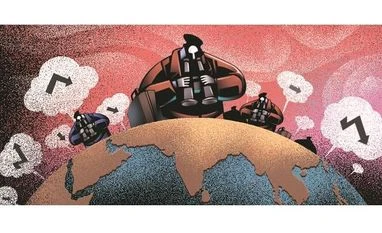Global shares lost ground during the early morning trade on Monday reacting sharply to China’s decision to tariff hike on $60 billion worth of US imports, which came into effect on Saturday, June 1.
While China's Shanghai composite index was trading 17.23 points or 0.59 per cent lower, Japan's Nikkei slipped 239 points, hovering close to its lowest levels in four months.
Indices on the Wall Street plummeted over a per cent after the tariff decision came into effect. The Dow Jones fell 355 points during the overnight trade on Friday to close at 24,815 while the S&P500 lost 37 points to end at 2,752 levels. The Nasdaq too lost 114 points to end the session at 7,453 levels.
China’s retaliatory move was in response to United States’ decision to hike import tariffs on $200 billion worth of Chinese goods. Last week, while the US President hiked import tariffs on all imports from Mexico, he also ended India's tariff-free access to the US market under the Generalised System of Preferences (GSP) scheme.
The unanticipated trade tensions that cropped up between two major economies in the world—the US and China— and spilled over other countires thereafter have since spooked the global capital markets.
Between May 5 and May 15, since the day Trump tweeted about his views on China till exit poll outcomes in India, the benchmark S&P BSE Sensex and the broader Nifty50 had lost 4 per cent with the indices seeing their worst ever selling streak of nine consecutive days.
However, between May 5 and May 30, the S&P BSE Sensex gained 3.1 per cent, while the Nifty50 moved up 3 per cent ignoring global cues. The rally was on account expectation of the National Democratic Alliance (NDA) securing a second consecutive term post the general elections that ended on May 19.
BENEFIT INDIA?
While a possible trade war has been averted for the time being, discussions on how India might benefit from this situation have already begun. Analysts suggest that India might not be able to “fill the gap" created by China as the country doesn’t have the required capacity.
“India isn’t a big trade partner to the US to be able to reap benefit from this trade war. Our exports have grown only recently and we don’t have traditional advantage as an exporting country,” says AK Prabhakar, head of research at IDBI Capital.
According to a report by UBS, the US imports of tariff goods from China comprised nearly 47 per cent of China's goods' export basket and 39 per cent of India's goods’ exports basket, as of 2017.
“In this situation, India as a country won’t have much of an impact. Firstly, we are a consumption driven economy, and secondly, after the first trade war concerns surfaced last year, our indices-including Bank Nifty- touched all-time high,” says Gaurang Shah, head of research at Geojit BNP Paribas. Thus, India has already discounted a trade war.
“In the long term, however, if there is a slowdown in China, it will definitely benefit India as an emerging nation in terms of investment and foreign direct investment (FDIs),” he says.
INVESTMENT STRATEGY
The top beneficiaries, according to analysts, would be the overlapping sectors between Indian export basket and items included in hiked tariff. These, they say, include industrials, chemicals, clothing/footwear, plastics, machinery and electrical/electronic products.
According to Shah of Geojit, the chemical sector, especially agro-chemicals and specialty chemicals, would benefit in the long-run.
For Prabhakar, chemicals and soda companies including Vinati, Tata Chemicals and Gujarat Alkelies could be profitable bets. "On the other hand, electronics could be an area of worry due to dumping of such goods in India. Anti-dumping should be in place for phone, laptop," he suggests.
According to Shah, electronics could only be affected indirectly as there aren’t many Indian players established in the country. That said, analysts believe, sectors such as steel, rubber, aluminium and plastics might need protection may need protection from unreasonable dumping by China.
Analysts are also placing bets on auto-ancillary, metals, information technology (IT) – likely sanctions on Huawei, hospitality and agriculture-related stocks. The indirect spill-overs, some analysts say, could also benefit allied sectors, such as consumption and financials.
“Textiles could have benefitted but Africa, Bangladesh and other Asian countries are at better position than India,” Prabhakar adds.
Unlock 30+ premium stories daily hand-picked by our editors, across devices on browser and app.
Pick your 5 favourite companies, get a daily email with all news updates on them.
Full access to our intuitive epaper - clip, save, share articles from any device; newspaper archives from 2006.
Preferential invites to Business Standard events.
Curated newsletters on markets, personal finance, policy & politics, start-ups, technology, and more.
)